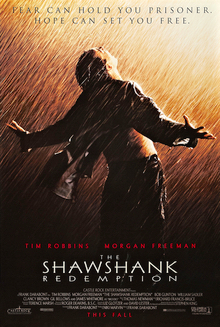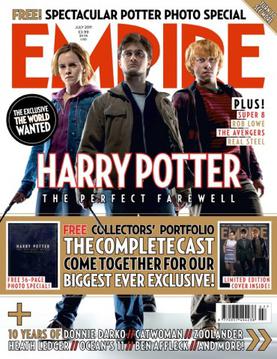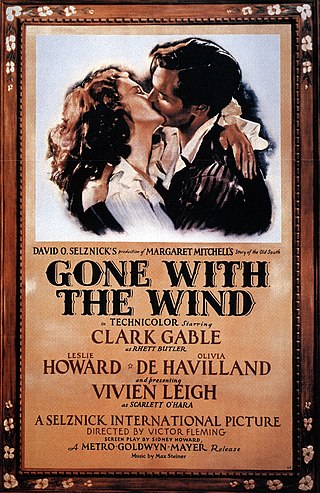Related Research Articles

Francis Ford Coppola is an American film director, producer, and screenwriter. He is considered one of the major figures of the New Hollywood filmmaking movement of the 1960s and 1970s. Coppola is the recipient of five Academy Awards, six Golden Globe Awards, two Palmes d'Or and a British Academy Film Award (BAFTA).

The Shawshank Redemption is a 1994 American drama film written and directed by Frank Darabont, based on the 1982 Stephen King novella Rita Hayworth and Shawshank Redemption. The film tells the story of banker Andy Dufresne, who is sentenced to life in Shawshank State Penitentiary for the murders of his wife and her lover, despite his claims of innocence. Over the following two decades, he befriends a fellow prisoner, contraband smuggler Ellis "Red" Redding, and becomes instrumental in a money laundering operation led by the prison warden Samuel Norton. William Sadler, Clancy Brown, Gil Bellows, and James Whitmore appear in supporting roles.

Forrest Gump is a 1994 American epic comedy-drama film directed by Robert Zemeckis and written by Eric Roth. It is based on the 1986 novel of the same name by Winston Groom and stars Tom Hanks, Robin Wright, Gary Sinise, Mykelti Williamson and Sally Field. The film follows several decades in the life of a slow-witted and kindhearted Alabama man named Forrest Gump (Hanks) and his experiences in the 20th-century United States. The film differs substantially from the novel.

Casablanca is a 1942 American romantic drama film directed by Michael Curtiz, and starring Humphrey Bogart, Ingrid Bergman, and Paul Henreid. Filmed and set during World War II, it focuses on an American expatriate (Bogart) who must choose between his love for a woman (Bergman) and helping her husband (Henreid), a Czechoslovak resistance leader, escape from the Vichy-controlled city of Casablanca to continue his fight against the Germans. The screenplay is based on Everybody Comes to Rick's, an unproduced stage play by Murray Burnett and Joan Alison. The supporting cast features Claude Rains, Conrad Veidt, Sydney Greenstreet, Peter Lorre, and Dooley Wilson.
The Academy Award for Best Picture is one of the Academy Awards presented annually by the Academy of Motion Picture Arts and Sciences (AMPAS) since the awards debuted in 1929. This award goes to the producers of the film and is the only category in which every member of the Academy is eligible to submit a nomination and vote on the final ballot. The Best Picture category is traditionally the final award of the night and is widely considered as the most prestigious honor of the ceremony.

Industrial Light & Magic (ILM) is an American motion picture visual effects company that was founded on May 26, 1975 by George Lucas. It is a division of the film production company Lucasfilm, which Lucas founded, and was created when he began production on the original Star Wars, now the fourth episode of the Skywalker Saga.

Alan Anthony Silvestri is an American composer and conductor of film and television scores. He has been associated with director Robert Zemeckis since 1984, composing music for all of his feature films including the Back to the Future film series, Who Framed Roger Rabbit, Forrest Gump, Cast Away, and The Polar Express. Silvestri also composed many other popular movies, including Predator, The Abyss, Father of the Bride, The Bodyguard, The Parent Trap, Stuart Little, The Mummy Returns, Lilo & Stitch, Night at the Museum, G.I. Joe: The Rise of Cobra, Ready Player One, and several Marvel Cinematic Universe films, including the Avengers films.

Romance films, romance movies, or ship films involve romantic love stories recorded in visual media for broadcast in theatres or on television that focus on passion, emotion, and the affectionate romantic involvement of the main characters. Typically their journey through dating, courtship or marriage is featured. These films make the search for romantic love the main plot focus. Occasionally, romance lovers face obstacles such as finances, physical illness, various forms of discrimination, psychological restraints or family resistance. As in all quite strong, deep and close romantic relationships, the tensions of day-to-day life, temptations, and differences in compatibility enter into the plots of romantic films.

Paul Henreid was an Austrian actor, director, producer, and writer. He is best remembered for two film roles; Victor Laszlo in Casablanca and Jerry Durrance in Now, Voyager, both released between 1942 and 1943.

Empire is a British film magazine published monthly by Bauer Consumer Media. The first issue was published in May 1989.

Jackie Moran was an American movie actor who, between 1936 and 1946, appeared in over thirty films, primarily in teenage roles.

The 67th Academy Awards ceremony, organized by the Academy of Motion Picture Arts and Sciences (AMPAS) took place on March 27, 1995, at the Shrine Auditorium in Los Angeles beginning at 6:00 p.m. PST / 9:00 p.m. EST. During the ceremony, AMPAS presented Academy Awards in 23 categories honoring the films released in 1994. The ceremony, televised in the United States by ABC, was produced by Gilbert Cates and directed by Jeff Margolis. Comedian David Letterman hosted the show for the first time. Three weeks earlier in a ceremony held at the Regent Beverly Wilshire Hotel in Beverly Hills, California on March 4, the Academy Awards for Technical Achievement were presented by host Jamie Lee Curtis.

Winston Francis Groom Jr. was an American novelist and non-fiction writer. He is best known for his novel Forrest Gump (1986), which became a cultural phenomenon after being adapted as a 1994 film of the same name, starring Tom Hanks. After the film was released, gaining a high box office and winning numerous awards, Groom's novel sold more than one million copies worldwide. Groom wrote a sequel, Gump and Co., published in 1995. His last novel was El Paso (2011).

Gone with the Wind is a 1939 American epic historical romance film adapted from the 1936 novel by Margaret Mitchell. The film was produced by David O. Selznick of Selznick International Pictures and directed by Victor Fleming. Set in the American South against the backdrop of the American Civil War and the Reconstruction era, the film tells the story of Scarlett O'Hara, the strong-willed daughter of a Georgia plantation owner, following her romantic pursuit of Ashley Wilkes, who is married to his cousin, Melanie Hamilton, and her subsequent marriage to Rhett Butler.
Aljean Meltsir Harmetz is an American journalist and film historian. She was the Hollywood correspondent for The New York Times from 1978 to 1990.
Monkey-ed Movies is a series of short films broadcast on the Turner Broadcasting System in the late 1990s. The films parodied popular films or television programs that were currently being broadcast on TBS with the use of costumed chimpanzees and orangutans voiced by human actors.

Leonid Kinskey was a Russian-born American film and television actor, best known for his role as "Sascha" in the film Casablanca (1942). His last name was sometimes spelled Kinsky.

Chick flick is a slang term, sometimes used pejoratively, for the film genre catered specifically to women's interests, and is marketed toward women demographics. They generally tend to appeal more to a younger female audience and deal mainly with love and romance. Although many types of films may be directed toward a female audience, the term "chick flick" is typically used only in reference to films that contain personal drama and emotion or themes that are relationship-based. Chick flicks often are released en masse around Valentine's Day. Feminists such as Gloria Steinem have objected to terms such as "chick flick" and the related genre term "chick lit", and a film critic has called it derogatory.
References
- 1 2 3 4 5 6 7 8 "Best in Film: The Greatest Movies of Our Time" (Press release). New York: ABC News. 2011-03-16. Archived from the original on 2011-03-26. Retrieved 2021-01-14.
- 1 2 3 4 Caverley, Alyssa (2011-03-22). "ABC Looks at The Greatest Movies of Our Time in New Special". Movie Fanatic. Archived from the original on 2017-10-24. Retrieved 2021-02-18.
- 1 2 3 "Best in Film: The Greatest Movies of Our Time". ABC News . 2011. Archived from the original on 2011-03-26.
- 1 2 Stodola, Ellen (2011-03-22). "'The Best in Film: The Greatest Movies of Our Time' Recap". The Celebrity Cafe. Archived from the original on 2014-02-19.
- ↑ "Best Movies Ever | 2011 Best In Film". ABC News . Archived from the original on 2011-04-03. Retrieved 2011-03-24.
- 1 2 Best In Film: The Greatest Movies Of Our Time (Television production). ABC News. March 22, 2011. Retrieved January 14, 2021– via Internet Archive.